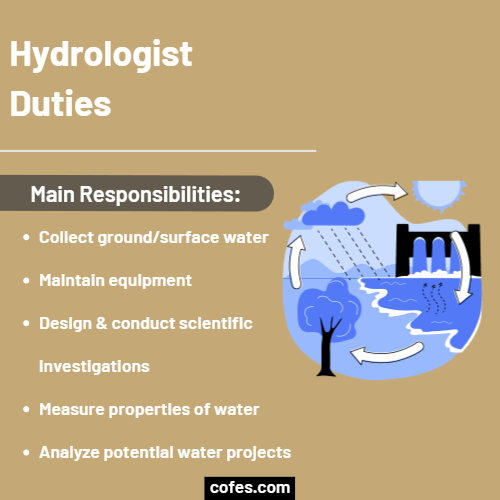If you have a passion for the earth and an interest in discovering ways to help clean and preserve our environment, becoming a hydrologist may be the perfect option for you.
By working indoors and outdoors, hydrologists get to explore our planet and study the nature of the water that fills it.
From researching projected conservation outlooks to examining the quality of our drinking water, hydrologists give back to our planet in a big way.
Hydrologist Job Information
| Official Job Title | Hydrologist |
| Average Salary | $84,030 |
| Stress Level | Average |
| Work/ Life | Average |
| Job Satisfaction | High |
| Career Advancement | Above Average |
Hydrologist Job Description
What Is A Hydrologist?
A hydrologist is a scientist that focuses on the physical properties of bodies of water, researching the distribution and circulation of water and how it affects the earth around us.
It is considered a ‘green job’ because they often use their findings to assist environmental scientists in preserving the environment.
They may search for groundwater and study how underground and surface bodies of water move through the earth.

What Does A Hydrologist Do On A Daily Basis?
The day-to-day tasks of a hydrologist vary depending on the specific field of hydrology in which they specialize.
The responsibilities of a hydrologist may include wading through bodies of water to collect samples or install and maintain equipment, conducting scientific investigations, and collaborating with a team in a classroom or office setting.
Often, a hydrologist’s occupation will require domestic and international travel.
Responsibilities, Duties & Roles Of A Hydrologist
- Collecting ground and surface water, determining the extent of contamination, or conducting projects using the collected data
- Calibrating and maintaining equipment
- Working with local, state, and federal governments
- Preparing written and oral reports demonstrating findings
- Designing and conducting scientific investigations
- Measuring properties of underground and surface waters
- Analyzing the prospect of water-related projects and the potential adverse environmental impacts
Hydrologist Salary
Average Salary
According to the U.S. Bureau of Labor Statistics, the median annual wage for Hydrologists was $84,030 in May 2021.
Starting Salary
The average salary for an entry-level position as a hydrologist is $51,120 a year.
Senior Salary
An experienced hydrologist with 10-19 years on the job has an average yearly salary of $135,170.
How To Become A Hydrologist

The Entry Level: Certification, Training & Degree
A bachelor’s degree in a related field of study, such as environmental science, engineering, or earth science, is required to become a hydrologist.
A background in statistics, environmental law, life sciences, and economics are useful when starting this career.
Some hydrologists obtain a master’s degree, which significantly impacts the average annual salary but is not required.
Certifications are optional as well, but many are available that help you stand above the rest of the applicants in this field.
Depending on the jurisdiction, a license may be required to work as a hydrologist.
Other Skill Sets, Requirements & Qualifications
- Communication skills:
- Hydrologists must produce written and oral reports to communicate their findings; creating a concise presentation of their research and findings is important.
- Analytical skills:
- Examining data and assessing outcomes requires an inherent ability to analyze.
- Critical thinking:
- As scientists, hydrologists will be faced with opportunities to apply critical thought to their work and will be expected to do it well.
- Interpersonal skills:
- Because hydrologists often work with a team of scientists and staff, an ability to work well with others is necessary.
- Physical stamina:
- Hydrologists often have to travel to areas they collect data from, including hiking and transporting heavy equipment and samples.
How Long Does It Take To Become A Hydrologist?
Depending on the level of education, the time it takes to become a hydrologist will vary.
If a master’s degree is obtained, it may take up to 8 years of study.
Is It Hard To Become A Hydrologist?
Becoming a hydrologist requires extensive work-related knowledge, making qualifying more difficult than average.
Hydrologist Career Paths
The Hydrologist Roadmap
- Earn a bachelor’s degree in a related field of study
- Obtain work experience in a similar occupation, such as a lab technician or assistant
- Obtain certification (optional)
- Obtain a license (optional)
- Earn a master’s degree
Projections For Growth In Hydrologist Jobs
According to the U.S. Bureau of Labor Statistics, the employment of hydrologists is projected to grow by 0% by 2031, meaning there won’t be a change.
There will be 600 new job openings yearly to replace retired workers, but no growth.
In Summary: Is Hydrologist A Good Career?
Because hydrologists play such a crucial role in our environmental preservation, those who work in the career find it incredibly fulfilling.
The high salary and value that the work provides make a hydrology career good.
However, anyone considering this field should keep job stagnation in mind.
Working Conditions
Can A Hydrologist Work Remotely From Home?
Some of the work done by hydrologists can be completed remotely, but certain aspects of the job will require travel to a laboratory, classroom, or offsite location.
How Many Hours Does A Hydrologist Work?
Typically, a hydrologist will work 40 hours a week with occasional overtime.
However, depending on the projects and travel necessary, these hours may vary weekly.
Can A Hydrologist Work Part-Time?
There are some jobs available as a hydrologist that are part-time.
What Are The Average Vacation Days Of A Hydrologist?
Most hydrologists receive standard benefits, including vacation days, but the exact number will depend on the specific company.
Alternative Careers & Similar Jobs to a Hydrologist
- Forensic Science Technician
- Nutritionist
- Natural Sciences Manager
- Dietitian
- Archaeologist
- Meteorologist
- Marine Biologist
- Physicist
- Research Assistant
Hydrologist Resume Tips
- Include any impactful seminars or conferences you have participated in to boost your resume and further demonstrate your depth of knowledge.
- If you have a portfolio that showcases special projects you have completed, include a link or copy of it.
Hydrologist Interview Questions
Q1: Are you comfortable working outdoors?
Why it works: Asking this question during an interview will help you assess the applicant’s ability to perform a critical component of the job.
If they are not comfortable working outdoors, they will not perform the work as well as a candidate who is.
Q2: Why did you choose a career in hydrology?
Why it works: Passion will play a large part in the quality of completed work, and this is a perfect question to gauge how motivated an applicant will be in their job.
Jobs Related To Hydrologist
- Environmental economist
- Hydrogeologist
- Geoscientist
- Hydrologic technician
- Soil and water conservationist
For HR Managers: Tips For Hiring A Hydrologist
Key Characteristics To Look For In A Hydrologist
- Reasoning skills
- Ability to work independently and in a team
- Clear and concise communication abilities
- Knowledgeable
- Passionate
- Organized
Minimum Level Of Education & Experience
The minimum level of education required for a hydrologist is a bachelor’s degree in a related field.
However, a master’s degree or several certifications will help demonstrate the amount of knowledge a candidate has in the material.
Experience as a lab technician or assistant will also prepare a candidate for a hydrologist’s responsibilities.
